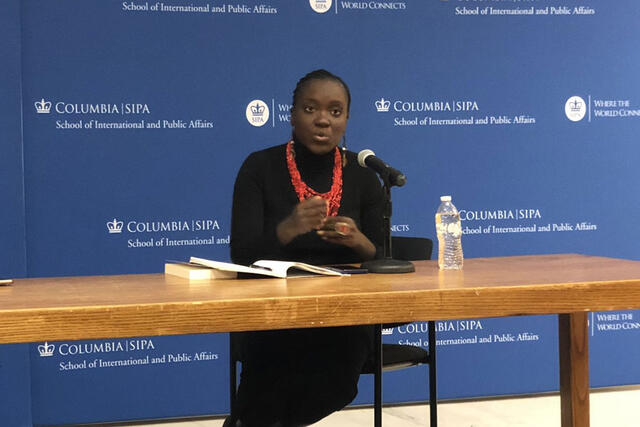
On Digital Democracy in Kenya

It was still sunny and bright when Nanjala Nyabola began to speak at SIPA on March 11, the first Monday evening of the spring semester after the onset of daylight savings time.
A Nairobi-based political analyst, writer, and humanitarian advocate, Nyabola was discussing her new book, Digital Democracy, Analogue Politics: How the Internet Is Transforming Politics in Africa, at the invitation of the SIPA Pan-African Network student group.
From the upheavals of recent national elections to the success of the #MyDressMyChoice feminist movement, Nyabola’s book examines how digital platforms have had a dramatic impact on political life in Kenya from 2007 to 2017.
In Nyabola’s words, the year 2007 had changed Kenya’s path “indefinitely.” While home on break from university, she witnessed the violence that engulfed Kenya after the 2007 election.
“The prospect of the country falling apart was literally at my doorstep,” said Nyabola.
That moment, she said, changed her life. Nyabola had aspired to be an investment banker, but changed career tracks to focus on politics and humanitarian issues.
In 2008, the Independent Review Commission was started in an attempt to use technology to help bridge the trust gap between key political actors and protect the autonomy of the bureaucracy surrounding elections. By the 2017 elections, Kenya had the most expensive in the world at $28 per head.
“It was a deliberate attempt to address the trust shortfall,” said Nyabola.
But, she asks, “does applying technology work?”
That’s what Nyabola’s book concentrates on: the agency, change and connection that technology has brought to Kenya. She examines the social movements started by Kenyans for Kenyans as well as the dangers of government control over the internet in a country whose elections happen on the web. The best and the worst aspects of the digital age as they are playing out in Kenya, where, Nyabola will remind you, Cambridge Analytical first started testing its now well-known techniques.
Nyabola’s presentation ended with questions from the audience that revolved around the role of government in social media and issues around China’s dominance of technology in Kenyan.
As the formal presentation concluded in the fading evening light, audience members lined up to greet Nyabola, eager to say hello and get copies of her book.
— Claire Teitelman MPA ’19